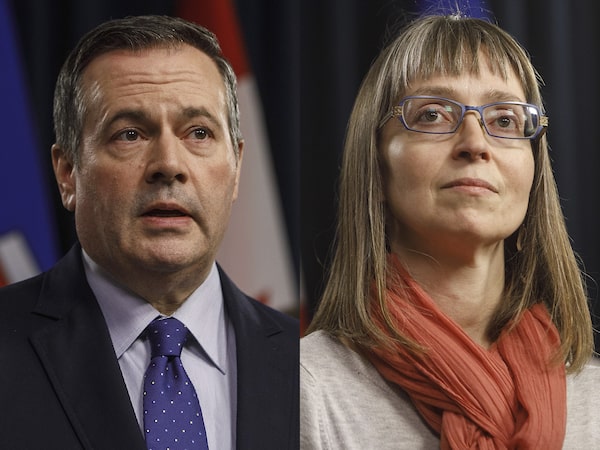
Alberta Premier Jason Kenney and Chief Medical Officer of Health Dr. Deena Hinshaw in Edmonton./Jason Franson/The Canadian Press
Andrew MacLean is a health policy analyst from Fredericton who currently attends medical school at McMaster University.
Before the COVID-19 pandemic, you’d be forgiven if you didn’t quite understand what it was that a medical officer of health actually did. After all, they don’t star in their own television shows, like the surgeons of Grey’s Anatomy or the emergency room doctors of ER, even though they too have training as specialized as such practitioners. Their traditional domain is far away from such dramatic split-second decisions. Instead, they operate in the world where safe water, clean restaurants, and flu shots are the pressing concerns of the day, and communication is at the core of the job.
But lately, the lives of medical officers of health have been rich in drama, with provincial spin-offs airing continuously on news networks for the past nine months, with their two co-stars, a province’s premier and its health minister, usually at their sides. And so they’ve needed their full toolkit at their disposal – which means that they must be able to speak to their patients unfiltered.
We may be used to those conversations happening one-on-one, but medical officers of health have entire populations as patients, and deliver their prescriptions on the radio, on Twitter and in front of television cameras. The public needs to be able to trust that this advice on such mass platforms is as unfiltered and honest as any conversation with a family doctor in a quiet clinic room.
That ability might be at risk. Earlier this month, a medical officer of health in Ontario found himself publicly expressing a position that a number of his colleagues likely support privately, and revealed that they have been forced to sign confidentiality agreements with the government as they deal with COVID-19. “It would be easier for me professionally – for us as a group – if we were able to speak freely,” Dr. Charles Gardner told The Globe and Mail. “I do believe that on a matter such as this there needs to be free exchange of information about the evidence, the considerations.”
Medical officers of health don’t make many decisions on their own. They make their best recommendations to politicians, who must also consider the economy, other social services, direction from their caucus and, well, politics. So there is a natural tension between medical officers of health and their political masters about what information to share. The public generally trusts doctors because we’re used to them honestly telling patients what’s going on. Politicians, on the other hand, are often masters of public relations and delivering careful non-answers.
When advice from medical officers of health is ignored by politicians, the doctors face a tough choice: swallow hard and get on board, or get out. Speaking out against their government’s direction can be a career-limiting move; in 2002, the medical officer of health for the Palliser Health Authority in southeastern Alberta was fired after he called for action on climate change, while in New Brunswick, the chief medical officer of health parted ways with the government in 2015 after a controversial run, which included a report on the health ramifications of shale gas development – a crucial part of the province’s economic development strategy. According to the CBC, she was “told to keep her study and her comments to herself.”
As the pandemic has dragged on, backroom tensions have run high between politicians and medical officers of health. In one high-profile incident just last week, media outlets reported on secret recordings of meetings with the chief medical officer of health in Alberta, Dr. Deena Hinshaw, who has reportedly had a number of differences of opinion with politicians. One, according to those leaks, resulted in her “getting in trouble with the [Health] Minister’s office.”
It’s a gamble to go against the government grain. But just as doctors must be careful with their prescription pads and scalpels, medical officers of health have a responsibility to be careful with their words. In exchange for having the freedom to speak to their patients freely, they must be clear on what the evidence is, when they are straying into the realm of opinion, and what they don’t know. And when they change their minds – as Canada’s Chief Public Health Officer Dr. Theresa Tam did, when she reversed course in April on mask-wearing in public spaces – they have to be able to explain clearly what new evidence caused the course correction.
The pandemic will continue for months to come. Medical officers of health need to be able to speak to their patients – the general public – freely. Governments should lose the confidentiality agreements with their own doctors. The public should demand nothing less.
Keep your Opinions sharp and informed. Get the Opinion newsletter. Sign up today.